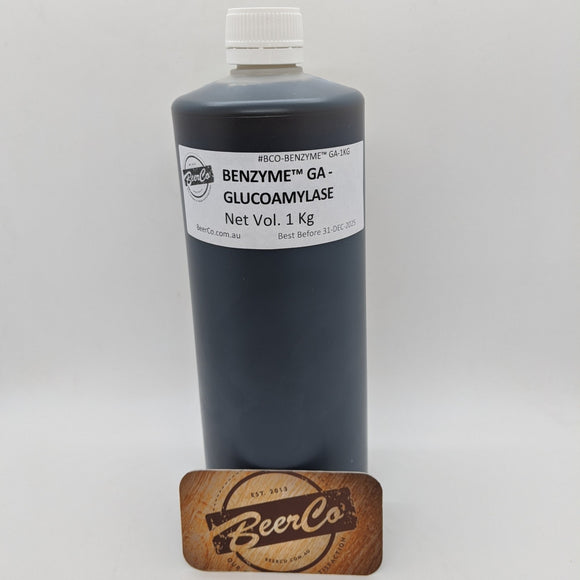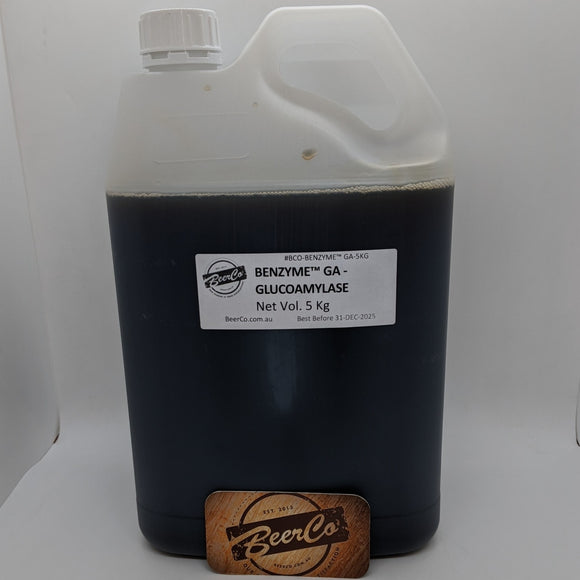Benzyme GA - Glucoamylase - Attenuation Enzyme is a glucoamylase for producing highly fermentable glucose-based worts. Benzyme AT is a cost-effective solution for attenuated beers. It allows you to achieve a high real degree of fermentation (RDF).
Benzyme GA - Attenuation Enzyme is a best in class glucoamylase for producing highly fermentable glucose-based worts.
In this product the key enzyme activity is provided by glucoamylase that hydrolyzes (1,4)- and (1,6)-alpha-D-glucosidic linkages at the non-reducing ends of polysaccharides.
Pack Sizes:
- 1Kg Bottle
- 5Kg Bottle (SAVE 20% OFF 1Kg Price)
- 25 Kg Canister novozymes Attenuzyme® Core
Key Benefits:
Achieve desired attenuation
This product delivers predictable and targeted real degree of fermentation (RDF). It helps you to control the percentage of fermentable sugars you derive from starch. It allows you to increase fermentable sugars or maintain them at a specific level so you can achieve your desired attenuation.
Accelerate fermentation
By releasing more fermentable sugars in the brewhouse, this product supports the need to accelerate your fermentation times.
For light beers
With this product, you can make light or low-calorie beers. It increases the degree of attenuation of the wort. That decreases the proportion of non-fermentable and short-chain dextrin material. The resulting beer will have up to 30% fewer calories than normal-attenuation beer with the same alcohol content.
Increase brewhouse capacity
This fast-acting product shortens mashing times. That allows you to increase brewhouse capacity while saving time and energy.
PRODUCT CHARACTERISTICS/PROPERTIES
Component name: Glucoamylase (glucan 1,4-alpha-glucosidase)
Activity: 1600 AGU/g
Side activities: The product contains controlled activity of Alpha-amylase
Color: Light to dark brown
Physical form: Liquid
Approximate density (g/ml): 1.11
Color can vary from batch to batch. Color intensity is not an indication of enzyme activity.
How glucoamylase enzymes help control attenuation in brewing?
Glucoamylases break down starch. They're usually brewers' first choice when making light or low-calorie beers. They're also used to make small attenuation adjustments. Combined with pullulanases, glucoamylases allow brewers to reduce conversion times.
Glucoamylases hydrolyze starch. They break α-1,4-glucosidic linkages at the non-reducing ends of amylose and amylopectin. They're just one of the enzyme classes used to control the degree to which sugars in the wort are fermented into alcohol. Getting attenuation right is about balancing enzyme class, dosage and conversion conditions.
Glucoamylases are typically brewers' first choice when producing highly attenuated beers. Consumers know these as light or low-calorie beers. Glucoamylases can also be used to make small adjustments in attenuation.
Used in combination with pullulanases, glucoamylases speed up starch breakdown. Brewers can use this enzyme combination to reach attenuation targets in shorter conversion times.
Amyloglucosidase (glucoamylase)
Glucoamylases are typically the first choice for a brewer to produce highly
attenuated beers, or to make small adjustments in attenuation. These enzymes
break α-1,4-glucosidic linkages at the non-reducing ends of starch (amylase
and amylopectin) as depicted in Fig. 6.3-1.

pH and temperature curves
Attenuation enzymes can be used in the brewhouse or possibly during
fermentation.
The degree of attenuation desired is governed by the choice of attenuation
enzyme (glucoamylase, α-amylase, pullulanase or combination), enzyme
stability (temperature and pH), enzyme dosage, conversion temperature and
conversion time.
When choosing an enzyme solution for attenuation control, it is important to
look at the activity curves for each based on temperature and pH. Select an
enzyme solution that has significant activity and stability where you want to use
it – in either mashing or fermentation.
Fig. 6.4-1 illustrates the temperature and pH activity curves for Novozymes'
attenuation enzymes. It is clear that from a pH point of view, all enzymes have
significant activity in the typical pH ranges encountered during brewing. From a
temperature perspective, Attenuzyme Core (and Attenuzyme Pro) and
AMG 300L BrewQ have high activity between 60°C and 70°C and would be
more suitable for mashing application than Fungamyl BrewQ, which undergoes
significant denaturation in this temperature range. Therefore, Fungamyl BrewQ
may be of more use in fermentation applications.

Usage

More information can be found in the “Brewing Handbook”.
Stability
Please see the Attenuzyme® Core - Product Data Sheet
Safety, handling and storage
Safety, handling and storage guidelines are provided with all products.


